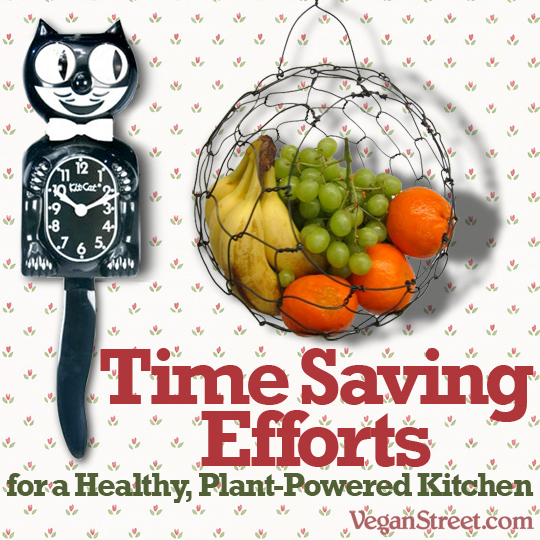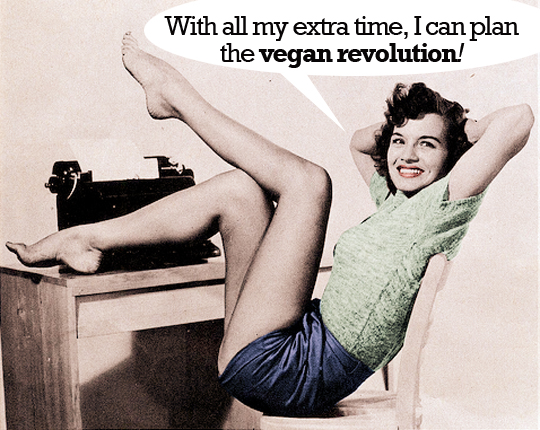
If you would prefer a printed softbound version of When Vegans (Almost) Rule the World, you can pick one up for just $11.99 at Amazon. Kindle eBook coming soon!

Available in either softbound or Kindle/Nook/etc. eBook at Amazon
viviansharpe.com

  Time Saving Efforts for a Healthy, Plant-Powered Kitchen I’m going to get the difficult part out of the way with a little tough-love: if you want to eat wholesome, health-providing meals, you are going to have to eat some fruits and vegetables. In order to do that, you are going to need to clean and prepare them first. There is no getting around it. You just are. That being said, this doesn’t mean that you have to spend hours upon hours washing, chopping, massaging and reading to your precious produce. With some kitchen savvy and advance planning, you can cut your kitchen time way back without sacrificing fresh ingredients. After a while, these shortcuts will become second nature to you and you won’t need to plan as much. There are my best time-saving tips for a healthy, plant-powered kitchen. (By the way, many of the same efforts that cut costs also cut time. Please check these pointers out, too.) Make a Weekly Meal Plan and Grocery Lists I cannot emphasize this enough. Making a weekly meal plan means that you won’t be scrambling and wondering what to make for dinner at the last minute because, ugh, who wants to do that? A meal plan saves time, money and all but guarantees that you will be eating healthier, home-cooked meals that might otherwise be eaten out or without as much consideration. Similarly, if you go into a grocery store with a list, not only can you save money by not buying as many impulse items but you can save lots of time that you would otherwise waste meandering around, wondering what to buy. Making a grocery list takes a little time but saves you loads more during the week and it also is a great way to ensure that you’re eating as healthfully as possible. When I am feeling ultra-ambitious, I organize my lists by where items can be found in the grocery store (for example, vegetables together, bulk goods together, frozen foods, etc.) and this also lessens the amount of time you will waste at the grocery store. Organize your lists by the stores you go to (we go to three depending on what we need) and you will be well on your way to a much more efficient grocery shopping experience.  Keep a Well-Stocked Kitchen, Especially the Pantry and Freezer If you have some kitchen staples on hand, such as garlic, ginger, potatoes, frozen peas, frozen corn, tomato sauce, pasta and beans, you can always improvise a tasty, healthful meal that can come together quickly without you needing to run to the grocery store at the last minute. What do you eat often? Keep those staples on hand, especially focusing on the things that can be kept for a while. This soup, made with vegetable stock, tamari, coconut milk, rice noodles, chickpeas, peas, corn, carrot, ginger, garlic, and lime juice came together for a quick, nourishing meal without anyone needing to go to the grocery store. Keeping items on hand will not only shorten the amount of time you need to spend preparing meals, but it will help you to learn to become a more improvisational cook. (Soups and stir-fries are especially improvisation friendly.) Whenever you go grocery shopping, make it a habit to stock up on the staple items you use often that are on sale.  Cook Smart There are many aspects to cooking smart (which these pointers technically all fall under) but what I am referring to here is the practice of cooking one large dish and using it several different ways throughout the week. For example, make a large pot of your favorite veggie chili and you can have it various ways through the week so you don’t get bored: on baked potatoes, in tacos or burritos, on top of pasta, and so on. I call this practice “extending the meal” and it is what we do in my home when we want homemade food but we don’t want to build every separate meal from scratch from beginning to end. It saves time, money and energy when we prepare at least one meal that can be extended like this throughout the week.  Batch Cooking As with the above example, remember that you don’t have to cook each individual meal and it is a better use of your time if you don’t. Cooking large batches of food for the week ahead on a day off means that you will have food through the week, including lunches to take to work. If you prepare a large amount of soup, casseroles, pilafs, stews and more, you can eat from that all week and devote far less time to individual meals. If you don’t want to eat it all within a week, consider freezing some for future meals. Slow Cookers and Pressure Cookers These are very worthwhile investments. With a slow cooker, after a quick sauté in the morning, you just add some things together into the pot, put on the settings, walk out the door, and when you come home after work, you not only return to a home that smells divine, but you have a dinner you made yourself with minimal effort. I highly recommend Robin Robertson’s Fresh from the Vegan Slow Cooker for excellent, easy recipes. Another option is the pressure cooker, which can help you to create fresh meals in minutes, including ones with dried legumes that normally take hours to cook. Take Full Advantage of a Hot Oven This is another one of those crossover tips that is not only thrifty and a better use of fuel, but one that saves time as well. If you have a hot oven for a meal you’re making, why not also throw some potatoes, winter squash, garlic bulbs for roasting and so forth in it, too? Don’t waste all that fuel on one dish. With just a little extra effort and forethought, you can have items ready to use for a future meal. If you take this into consideration when you’re planning your weekly meals, you will really be working smart.  Use Clear Storage Containers for Bulk Items Store dry items that you use often (for example, rice, barley, couscous, quinoa, pasta) so you can always see how stocked up you are and, ideally, leave these in a place where you can easily see them, like on your kitchen counter. It is a big hassle to realize that you have to run off to the store when you find out that the container you thought was full of rice only has a small amount. Clear containers, ideally glass, take the guesswork out of knowing how well-stocked you are in the kitchen. Wash, Chop and Store Produce Properly After grocery shopping, save a little time by preparing the week’s produce and storing it properly to extend its freshness. If your produce goes bad, not only is it a waste of money, it’s also a waste of your time. Please check out this excellent guide for produce storage tips. Don’t Peel Unless You Need To Peel If something is organic and just has a light peel, consider just scrubbing with a good vegetable brush and leaving the skin intact. Produce like white potatoes, sweet potatoes, carrots, daikon, apples and so on do not need to be peeled and, especially if organic, can use just a good scrub. Not only does this save time, the nutrients in and just below the peel are available to you. Make Breakfast as Simple as Possible While Still Nutritious Instead of waking up and rushing out without breakfast because you don’t have the time, consider your breakfast ahead of time to let your early morning self off the hook a little. Everything from overnight oats, chia puddings, green smoothies, whole grain muffins and more become available in a snap with a little planning the night before and let you begin your day with a easy, nutritious start. Consolidate Your Movements in the Kitchen When preparing a meal, it can be eye-opening how much time is wasted just grabbing things that could be close to you. All that walking around adds up! Consider keeping a large bowl by your cutting board for peels, seeds, etc. instead of going to the compost container or trash can each time. (If you don’t have a garden for compost, consider collecting your scraps and donating them to a nearby community garden or creating your own vegetable stock out of the scraps. Also, consider a mise en place (“putting in place”) approach to cooking, like what you see on cooking shows with everything prepped and ready for the skillet or pot when you are ready to go.  Keep Your Kitchen Organized If you’re running around looking for your garlic press, the right spatula, your colander, your paring knife and so on, it stands to reason that you are wasting valuable time. Put them back in the same drawer or container every time and that it one less thing you need to think about when preparing your meals. Keeping the things you use most often the easiest to access is also a good idea. In other words, don’t drop your measuring spoons in the middle of a disorganized junk drawer if you use them a lot. Read Through a Recipe First How many times have you added more time to preparing a meal because you hadn’t read a recipe through completely? When you forget to preheat the oven on or don’t realize that you need to defrost something, you are wasting time. Read through a recipe so you get a sense of what needs to happen; the recipe should let you know what needs to happen in what order. Don’t forget to thoroughly read the ingredients list and take note of what needs to be defrosted, chopped, etc. Utilize your freezer A meal in the freezer is a meal you don’t have to cook again. Check out this guide for freezer tips. Clean as You Go Fill your empty sink with hot water and a little dish soap. When you are done with needing your cutting board, knives, pans and so on, wash them so they won’t be something you need to worry about after dinner or let them soak to make for a quicker cleaning. Buy Only the Kitchen Tools that Make Your Life Easier What do you use often? We use a peeler, a few good knives, a food processor, a blender and my favorite cast iron skillet almost every day. They are tools that I trust and use very often. Finding the tools that work for you and keeping them handy helps to cut down on your time in the kitchen. No one is superhuman so there are going to be inefficient moments in even the most highly organized lives. That being said, why not cut down on inefficiencies so as to maximize the time we get to enjoy outside of the kitchen? You can eat healthfully without spending an eternity washing and chopping vegetables, I promise. By utilizing even a few of these tips, you will make your life easier and the time you spend preparing meals more productive and enjoyable. Give them a try! © 2013, 2014, Vegan Street |













 |
 |
 |
 |
 |
 |
 |